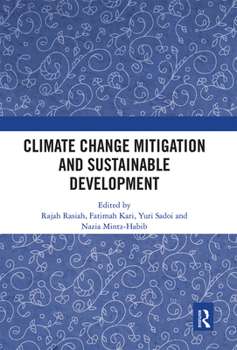Climate Change Mitigation and Sustainable Development
This book focuses on different aspects of initiatives--to check pollution and to reduce consumption of fossil fuels--by the Association of Southeast Asian Nations (ASEAN). The chapters examine climate change projections for ASEAN, the relationship between income inequality and environmental sustainability, greening initiatives pursued by microfinance institutions, farmers' awareness and perceptions of climate change, potential introduction of hydrogen fuel cell vehicles in Malaysia, the impact of Euro-4 automobile emission regulations on the development of technological capabilities and the threats and vulnerability people face from climate change and national disasters.
The United Nations Framework Convention for Climate Change's Conference of Parties meetings to cap temperature rise to 1.5 degrees Celsius over the next century has set the steering and the interventions essential for mitigating global warming. There is increasing recognition that initiatives must be taken across the globe regardless of the state of development of each individual country, and so this book has important practical implications.
This book was originally published as a special issue of the Journal of the Asia Pacific Economy.





